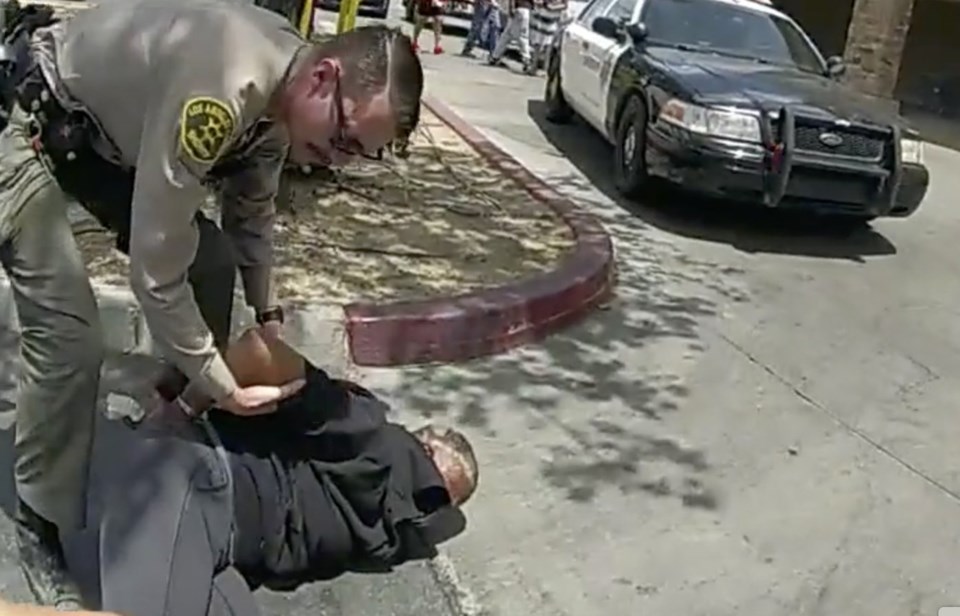LOS ANGELES (AP) — A Los Angeles sheriff's deputy will serve four months in prison on a misdemeanor conviction for using excessive force after the new Trump-appointed U.S. attorney offered an unusual plea deal despite a jury convicting him of a felony.
The victim's attorney asked a federal appeals court to reinstate the felony conviction, but the court declined to do so on Thursday.
Deputy Trevor Kirk was recorded tackling and pepper-spraying an older woman while she filmed a man being handcuffed outside a supermarket in June 2023. A federal jury in February found Kirk guilty of one felony count of deprivation of rights under color of law, a crime that carries a prison sentence of up to 10 years. Felony convictions also prevent law enforcement officials from continuing to serve or owning a gun.
But when U.S. Attorney Bill Essayli took office a few months later, federal prosecutors offered Kirk a plea deal — a dismissal of the felony if Kirk pleaded guilty to a misdemeanor, and a recommendation of one year of probation. A judge agreed to the lessened charge but sentenced Kirk to four months in prison on Monday.
Essayli said in a video posted online that prosecutors also offered Kirk a misdemeanor plea agreement under the prior administration, which he turned down.
“After reviewing this case extensively and thoroughly and carefully reviewing the facts and the law, I made the decision to re-extend the misdemeanor plea agreement to Deputy Kirk,” Essayli said.
In court filings signed off by Essayli, prosecutors wrote they believed that Kirk's actions fell on the lower end of the excessive force spectrum, the woman did not suffer “serious bodily injury," and that the case was prosecuted improperly.
Some former prosecutors and police conviction experts called the step highly unusual, especially without any indication of prosecutorial misconduct, ethical violations or new evidence in the case. It follows President Donald Trump's vow to “protect and defend" law enforcement officers from prosecution and his efforts to assert greater control over the U.S. Justice Department.
“It’s very unusual to offer a plea deal after a conviction,” said Jeffrey Bellin, a former federal prosecutor from Washington, D.C., who is now a law professor at William and Mary Law School. In cases where it could happen, there's usually new evidence of innocence, “not just the same evidence from a different perspective,” he said.
Kirk's attorney, Tom Yu, said they filed a motion for acquittal that was denied but planned to appeal the decision.
The encounter
Caree Harper, who represents the woman Kirk injured, said in court filings that the federal government changed its account of the incident to make Kirk's actions seem justified.
In the original indictment, prosecutors wrote Kirk “violently” threw the woman to the ground. In the new plea agreement, the government alleged the woman “swatted” at Kirk and “resisted,” Harper wrote, which she said was not proven in the criminal trial nor testified to in civil litigation.
She said her client did not commit a crime, had no weapon, and did not try to flee or resist. She suffered from a black eye, a fractured bone in her right wrist, multiple bruises, scratches and significant chemical burning from the pepper-spray.
Harper said the plea agreement sent a “dangerous message” that law enforcement officials could be convicted of a felony and still “cut a backroom deal after the trial.”
Philip Stinson, a former police officer and attorney who studies police misconduct, said the plea deal offered to Kirk was “seemingly without precedent” in federal court cases prosecuting police officers for their on-duty crimes, according to his search of an internal database of more than 24,000 arrest cases in the last 20 years involving sworn law enforcement officers.
LA County Sheriff's Department spokesperson Nicole Nishida said Kirk will remain employed with the agency but relieved from duty while it conducts an internal investigation to determine if any policy or procedures were violated.
A new approach by federal prosecutors
Kirk's case is the latest showing the Trump administration's plan to take a lighter hand in the federal government's traditional role in prosecuting police misconduct. Trump's April executive order on policing promised the “unleashing” of law enforcement and support for their legal defense.
The Justice Department announced in May it was canceling proposed consent decrees reached with Minneapolis and Louisville to implement policing reforms in the wake of the killings of George Floyd and Breonna Taylor. The department also announced it would retract its findings in six other sweeping investigations into police departments that the Biden administration had accused of civil rights violations.
Trump-appointed federal judges have also played a hand in dismissing cases against police officers, including murder charges against a former Atlanta police officer who shot and killed an unarmed man hiding in a closet in 2019.
Experts say the reliance on the federal government to perform this policing oversight comes from the close relationship between local prosecutors and police officers, who regularly work together to investigate crimes.
“We are often looking at the federal government to serve as a check and balance for local law enforcement officials who are accused of really egregious activity toward the public,” said Devin Hart, a spokesperson for the National Police Accountability Project.
All four members of the original prosecutors withdrew from the case after the new plea deal was presented, and at least one resigned from the office, according to court filings. Two others took the buyout offered to federal employees, spokesperson Ciaran McEvoy confirmed.
Jaimie Ding, The Associated Press



